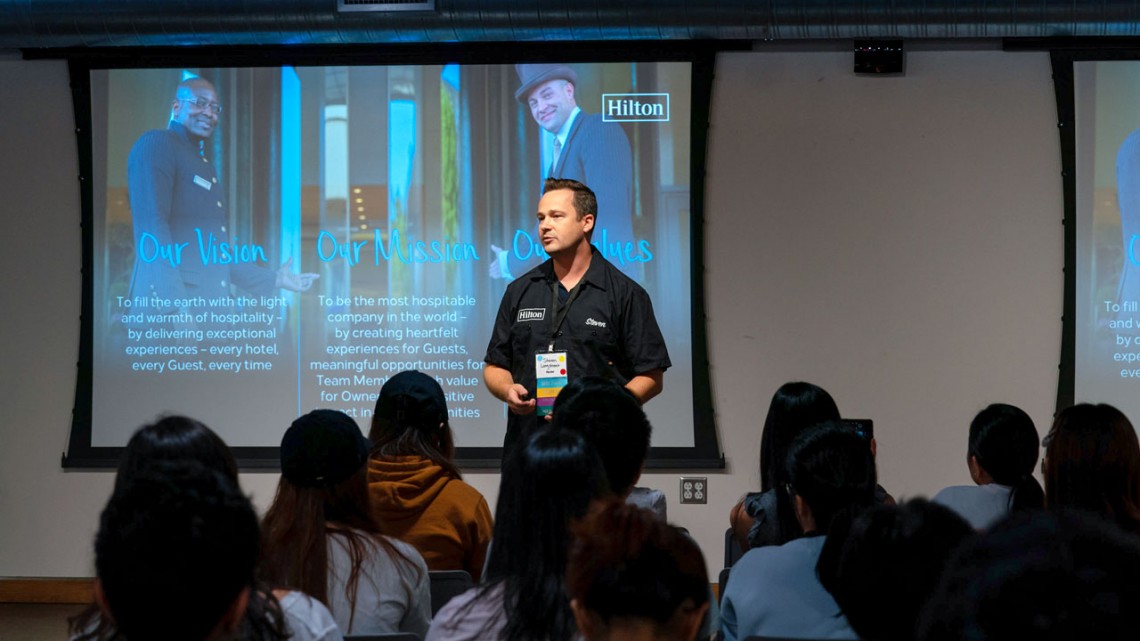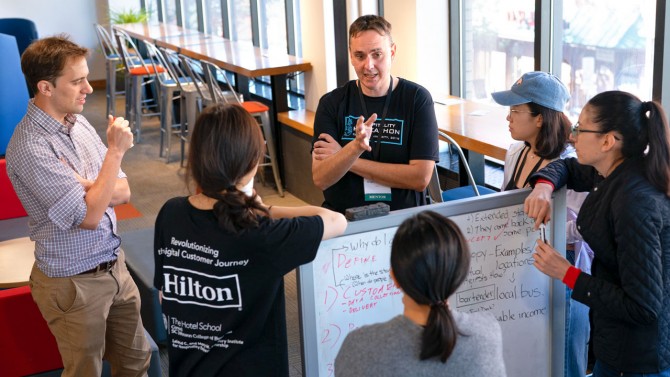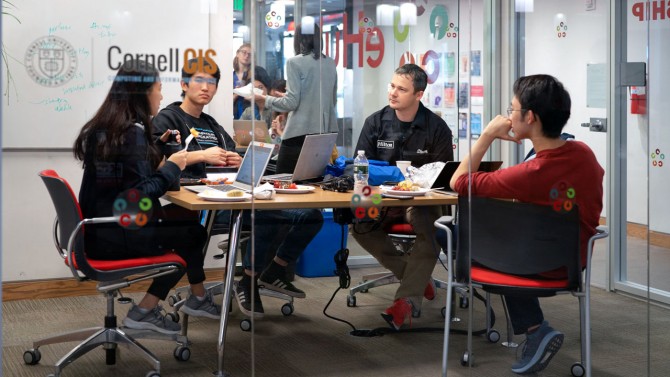
Steven Longstreet, director of strategy and innovation at Hilton, addresses participants in the School of Hotel Administration’s Hospitality Hackathon, hosted Sept. 20-22 at eHub in Collegetown.
Hackathon merges data savvy with passion for hospitality
By James Dean
You’re a light sleeper who loves to exercise, but find that your hotel room faces a busy street and is not near the facility’s gym.
Hotels could avoid this type of mismatch by offering guests a short survey about their preferences during the booking process, a trio of Cornell freshman engineering students proposed during the Hilton Hospitality Hackathon, Sept. 20-22.
Their idea to facilitate a “frictionless” arrival and check-in, along with opportunities to support housekeeping staff, won the $3,000 grand prize at the hackathon hosted by the School of Hotel Administration’s Pillsbury Institute for Hospitality Entrepreneurship.
“Hotel guests currently have little understanding of where they’re being placed relative to other guests,” Max Li ’23 said of the problem his team sought to address. “We offer a mechanism to provide recommendations to the guest directly on what rooms would fit them best.”
Li’s three-person L’Hospitality team was one of 11 formed by dozens of undergraduate and graduate students from across Cornell during the weekend event at eHub in Collegetown. They tackled three challenges presented by Hilton representatives, and received support from the industry team as well faculty mentors and judges from the School of Hotel Administration, College of Engineering, Charles H. Dyson School of Applied Economics and Management and Johnson Graduate School of Management.
“We’re really proud of this experience,” Kate Walsh, MPS ’90, dean of the Hotel School, said in kicking off the competition. “To me it represents the best part of Cornell: It’s interdisciplinary and engaged learning at its best.”
A hospitality-themed hackathon might sound paradoxical, acknowledged Jess Petitt, SHA ’05, vice president of analytics at Hilton. Hackathons typically make one think of technology companies and faceless coders huddled over laptops, he said – not the experience Hilton was after in its event or on the job.
“We get to merge that hard, technical data side of what we do with the passion and experience that comes from a hospitality space,” said Petitt, who leads a team of nearly 100 data analysts.
For Hilton and the industry, a better understanding of the billions of data points that customers generate each day holds the potential to improve their experiences, drive revenue and create jobs, Pettit said.
This year’s Hospitality Hackathon asked the students: “In a world of limitless possibilities, how do you connect a customer with their dream experience?” Challenges included improving “digital customer journeys,” including the hotel search process and developing more personalized experiences.
A $1,000 first-place prize in one category went to team “Sticky Notes,” five master’s students who pitched “Business Getaway,” an app enhancement targeting the growing “bleisure” category of travelers mixing business and leisure. Team members are Stefan Hench, Frances Wang, Yi Xuan Huang, Paulina Endara and Kana Suda.
“I’m really happy to take advantage of all the opportunities I can to get my hands dirty and practice using the skills that we learn in class, and also get a sense of the challenges that real-world companies are facing,” Hench said. “Even though we weren’t coders or software engineers, we could all contribute in a very meaningful way.”
In addition to suggesting ways to connect customers with the right rooms, the L’Hospitality team’s grand prize-winning “Project Mu” (a reference to the Greek symbol representing the coefficient of friction) sought to ease burdens on hotel operations staffs.
The team of Li and computer science majors Rachel Zhou ’23 and Jerry Sun ’23 suggested grouping similar types of guests, such as business travelers. Housekeeping could then tend more efficiently to rooms clustered together rather than scattered across a property. GPS data (if app users opted into its collection) also could confirm if guests had departed before the designated checkout time, again helping housekeepers to ready rooms for the next arrivals.
Li, in his first semester studying mechanical engineering at Cornell, said he was eager to broaden his skills by seeking out experiences beyond his own college and major. The grand prize money – plus two free nights at a Hilton hotel – was a bonus.
Media Contact
Get Cornell news delivered right to your inbox.
Subscribe


